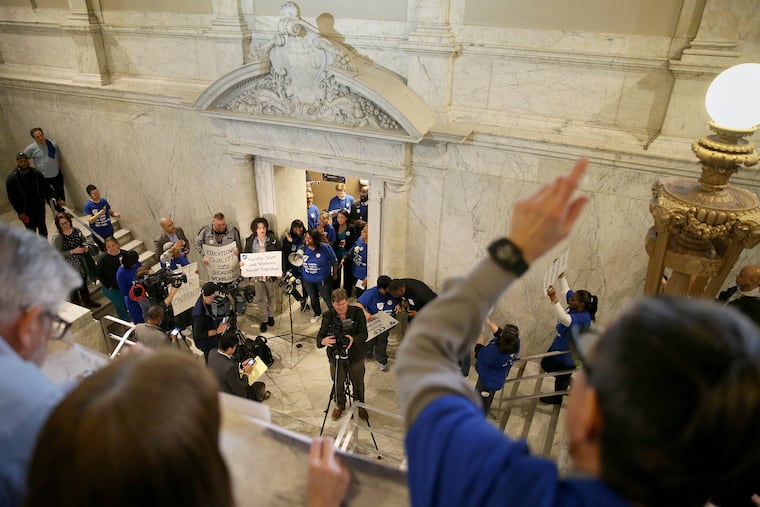Marathon negotiations resume at Community College of Philadelphia
Faculty and support staff have been operating under the terms of a contract that expired in August 2016. The sides have been divided over faculty workload, health insurance and compensation.

Marathon negotiations to hammer out a contract with faculty and support staff at Community College of Philadelphia and avoid a strike resumed at 11 a.m.
After three years of largely stagnant negotiations, it’s the fourth consecutive day of intense efforts to get an agreement at the 27,800-student college.
“I think it has been positive in that we have seen some progress,” union co-president Junior Brainard said shortly after 10 a.m. “But there are still items that we need to see progress on to avoid a strike. It really depends on the details."
The union was waiting to review proposals in writing from the administration, he said. The sides are talking through a mediator.
The college administration did not comment on any potential progress in the talks.
“The college administration is working hard to reach fair agreements that allow the college to continue to provide a quality and affordable education to all Philadelphians and which also demonstrates that we value our employees,” said Judith Gay, vice president for strategic initiatives and chief of staff. “We do not believe a strike is anyone’s best interest, and particularly not in the best interest of our students.”
After more than 17 hours in intense negotiations that began at 9:30 a.m. Tuesday, the union and administration temporarily suspended talks about 3:30 a.m. Wednesday.
Brainard said the union decided it would strike on Wednesday as threatened and classes were in session.
“We need some critical information that will not be available until the start of today’s business day,” he said in an email at 3:41 a.m. “We need a bit more time to gather information.”
Progress was made, he said, but it’s too early to say whether it will be enough to avert a strike.
“There are some critical decisions we have to make based on follow up information,” he said.
If a strike is called, it would be the union’s first strike since a two-week walkout in 2007, and it would have the potential of shutting down classes just weeks shy of the semester’s end.
The union, which represents 1,200 faculty and support staff, was readying picket signs on Tuesday, Brainard said.
Meanwhile, LInda Wallace, the college spokesperson earlier yesterday said in a statement that the union’s proposal would increase the college’s operating budget by $82.8 million over the eight-year life of the contract — a little more than $10 million a year — and that could affect tuition.
“A $1 increase in tuition generates about $320,000 at CCP,” she said. “So if we added $2 million to our budget for salaries that would equate to a $6.25 increase per credit hour.” Philadelphia residents currently pay $159 per credit hour.
She said the administration’s proposal will allow employees to take home an average net of at least an eight percent increase in pay over the next two and a half years.
Tuesday was the third consecutive day of marathon bargaining with a mediator, as the union and college try to avert a strike.
City Council President Darrell L. Clarke urged the parties to reach an agreement.
“It is imperative that students enrolled in CCP continue to receive their education without interruption, and as such I urge both sides to remain at the bargaining table in order to reach a fair contract as soon as possible,” he said in a statement issued Tuesday.
If a strike occurs, the college said it would try to keep classes running but would suspend them if not enough faculty showed up. Offices and buildings at CCP would remain open, the school’s president has said.
Pressure at the college has been building for months, with escalating demonstrations, public statements and posturing. In January, CCP president Donald “Guy” Generals said the college was considering imposing its last best offer, details of which were released in May. That proposal, retroactive to Sept. 1, 2016, and running through Aug. 31, 2021, would give union members more than a 10 percent cumulative raise, but also would require heavier workloads for newly hired faculty, as well as health-care contributions.
The minimum starting salary for a full-time faculty member is $50,529, with the average below $70,000. Some support staff earn less than $13 an hour.
Last Wednesday, members overwhelmingly voted to authorize union leaders to call a strike.
Faculty and support staff have been operating under the terms of a contract that expired in August 2016. The sides have been divided over faculty workload, health insurance, and compensation.